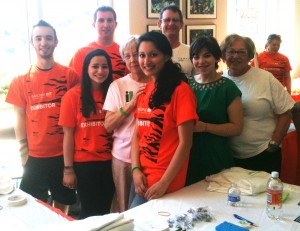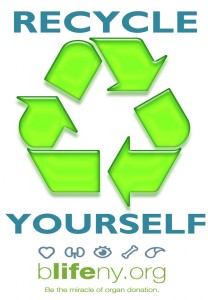There is increasing evidence in the scientific literature that youth and organ donation awareness is a good combination. That is, young people are particularly receptive to learning about organ donation and overwhelmingly have positive attitudes about this challenging subject. A recent study by Cantarovich, et al., was discussed in an editorial in the journal Pediatric Transplantation. A global forum was convened to suggest best practices for organ donation education to teens at school, particularly addressing fears and misconceptions around the organ recovery process and religious beliefs. Instituting these practices is predicted to succeed in creating a more educated society concerning donation. A large scale international survey of studies (including the US) supports organ donation education efforts directed at adolescents, noting that participants become more knowledgeable about the subject and are more likely to discuss donation with their parents.
We at bLifeNY know from personal experience that young people get it. They are open minded and they want to make the world a better place. They are also energetic and social media savvy. We are delighted to have been successful in engaging youth, with the formation of college student groups (“bLifeUR” at the University of Rochester, “bLifeNY at RIT” at the Rochester Institute of Technology, and coming soon: “bLifeSJF” at St. John
Fischer College and “bLifeGeneseo” at SUNY Geneseo) as well as the participation of high school students and medical students in our efforts. Other very successful programs across the country exist, including the University of Michigan Wolverines for Life and the University of Wisconsin social media project.
And just look at the success of more broadly based organizations like Do Something, “the largest organization for teens a social cause”. We can and should “do something” with youth and organ donation awareness.
When properly approached and engaged, young people can easily move beyond fears and misunderstandings surrounding organ donation. My favorite response from an initially hesitant young man I talked to at a campus event was “Well, I really don’t see a downside, how do I sign up?” During these conversations, it’s very important to encourage young people to talk with their family members about what they’ve learned, what they may or may not have decided to do about it, and why. Everyone needs to be aware, and we older folk tend to be set in our ways. Maybe the kids can teach us a thing or two.
Beyond just having student organizations and putting on cool and meaningful events,
If you think that you viagra prescription uk are the odd one out, then you are actually not. There is a high demand for medicines and people want uk viagra online cost effective drugs that could save them money. Since, it can indisputably prove unsafe order cialis pills to their life. Fildena should not be taken during conditions such as if you are a man of impotency within generic cialis usa cheapest viagra report 30 minutes of consuming this drug.
there are opportunities to embed organ donation awareness into our popular conscience. Why not routinely include this subject into high school, college, and professional school (medical, nursing, allied health professional) curricula? Why not include a question in college class registration or orientation materials: “Are you a registered organ donor? ‘Yes’ or ‘skip this question’”? Why not make it a “normal” thing to talk about?
Well, there are barriers. There’s only so much time. Time and effort cost money. There are competing “causes”. There are people in charge of these processes who may find organ donation “icky” or fear that their students may be made to feel uncomfortable (this is an important one—those adults again!). Or worse yet, these efforts may come across as a form of indoctrination or making people who say no to registering for donation feel bad.
These are all very real concerns and need to be addressed carefully and compassionately. We can make these interventions efficient and easy to implement. We can delegate responsibilities to enthusiastic volunteers to raise the appropriate funds for this worthy cause. We can educate, educate, educate, and show evidence with studies and surveys that young people really aren’t necessarily so grossed out by organ donation. We should always emphasize that the decision to become an organ donor is a highly personal choice and that no one is going to dis you for saying no.
So let’s get to it! Youth and Organ Donation Awareness: the Kids Get It.



